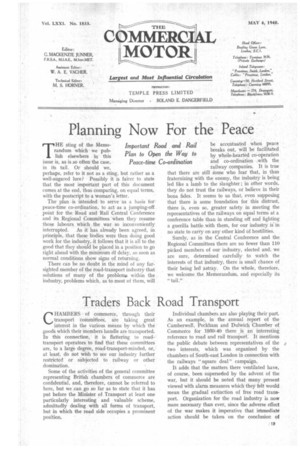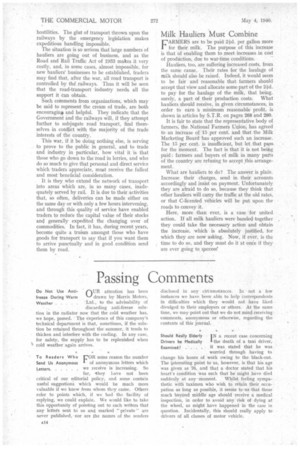Traders Back Road Transport C HAMBERS of commerce, through their transport
Page 15

Page 16

If you've noticed an error in this article please click here to report it so we can fix it.
committees, are taking great interest in the various means by which the goods which their members handle are transported. In this connection, it is flattering to roadtransport operators to find that these committees are, to a large degree, road-transport-minded, or, at least, do not wish to see our industry further restricted or subjected to railway or other domination.
Some of the activities of the general committee representing British chambers of commerce are confidential, and, therefore, cannot be referred to here, but we can go so far as to state that it has put before the Minister of Transport at least one particularly interesting and valuable scheme, admittedly dealing with all forms of transport, but in which the road side occupies a prominent position. Individual chambers are also playing their part. As an example, in the annual report of the Camberwell, Peckham and Dulwich Chamber of Commerce for 193940 there is an interesting reference to road and rail transport. It mentions the public debate between representatives of the two interests, which was organized by the chambers of South-east London in connection with the railways "square deal" campaign.
It adds that the matters there ventilated have, of course, been superseded by the advent of the war, but it should be noted that many present viewed with alarm measures which they felt would mean the gradual extinction of free road transport. Organization for the road industry is now more necessary than ever, since the adverse effect of the war makes it imperative that idunediate action should be taken on the conclusion of hostilities. The glut of transport thrown upon the railways by the emergency legislation makes expeditious handling impossible.
The situation is so serious that large numbers of hauliers are going out of business, and as the Road and Rail Traffic Act of 1933 makes it very costly, and, in some cases, almost impossible, for new hauliers' businesses to be established, traders may find that, after the war, all road transport is controlled by th6 railways. Thus it will be seen that the road-transport industry needs all the support it can obtain.
Such comments from organizations, which may be said to represent the cream of trade, are both encouraging, and helpful. They indicate that the Government and the railways will, if they attempt further to subjugate road transport, find themselves in conflict with the majority of the trade interests of the country.
This war, if it be doing nothing else, is serving to prove to the public in general, and to trade and industry in particular, how vital it is that those who go down to the road in lorries, and who do so much to give that personal and direct service which traders appreciate, muAt receive the fullest and most beneficial consideration.
It is they who extend the network of transport into areas which are, in so many cases, inadequately served by rail. It is due to their activities that, so often, deliveries can be made either on the same day or with only a few hours intervening, and through this quality of service have enabled traders to reduce the capital value of their stocks and generally expedited the changing over of commodities. In fact, it has, during recent years, become quite a truism amongst those who have goods for transport to say that if you want them to arrive punctually and in good condition send them by road.
Milk Hauliers Must Combine
E-ARMERS are to be paid 2itl. per gallon more for their milk. The purpose of this increase is that of enabling them to meet increases in cost of production, due to war-time conditions.
Hauliers, too, are suffering increased costs, from the same cause. Their rates for the haulage of milk should also be raised. Indeed, it would seem to be fair and reasonable that farmers should accept that view and allocate some part of the 2-id. to pay for the haulage of the milk, that being. surely, a part of their production costs. What hauliers should receive, in given circumstances, in order to earn 'a minimum reasonable profit, is shown in articles by S.T.R. on pages 268 and 280.
It is fair to state that the representative body of farmers, the National Farmers Union, has agreed to an increase of 15 per cent, and that the Milk Marketing Board has approved such an increase. The 15 per cent. is insufficient, but let that pass for the moment. The fact is that it is not being paid : farmers and buyers of milk in many parts of the country are refusing to accept this arrangement.
What are hauliers to do? The answer is plain. Increase their charges, send in their accounts accordingly and insist on payment. Unfortunately they are afraid to do so, because they think that other hauliers will carry the traffic at the old rates, or that C-licened vehicles will be put upon the roads to convey it.
Here, more than ever, is a case for united action. If all milk hauliers were banded together they could take the necessary action and obtain the increaSe, which is absolutely justified, for which they are now asking. Now, if ever, is the time to do so, and they must do it at one if they are ever going to spcceee




























































